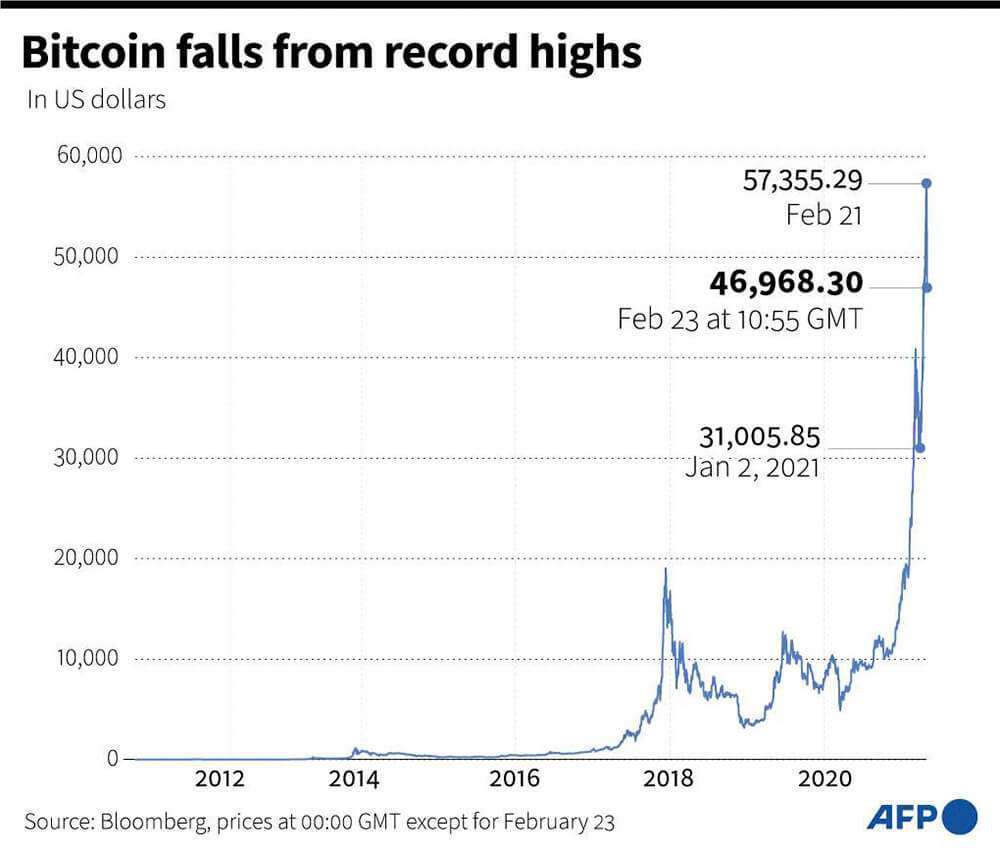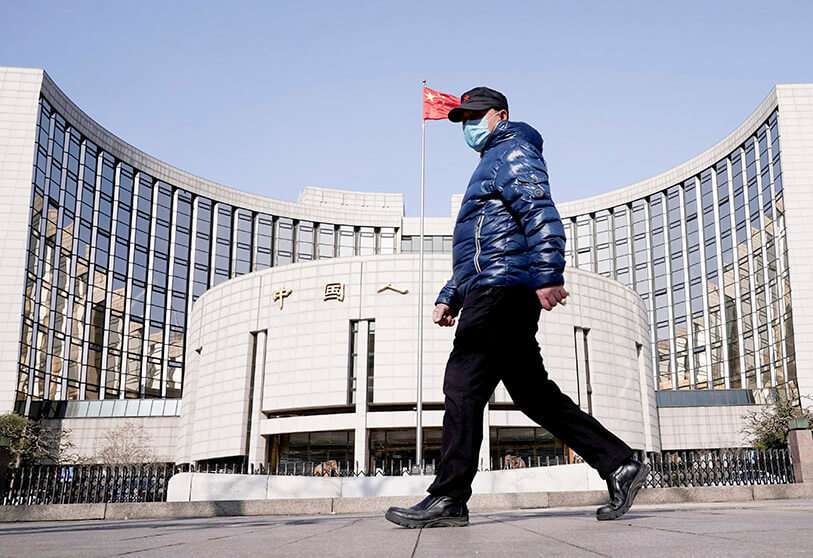Can cryptocurrencies drive a COVID-19 recovery in emerging markets?

Demand for Bitcoin has been surging globally since the beginning of the coronavirus pandemic, with interest reaching a fever pitch early this year. While it is not without its potential pitfalls, emerging economies are increasingly looking to cryptocurrencies as a way to drive their recoveries from the economic fallout of the virus.
Early this month, US firm Tesla announced it had bought the equivalent of $1.5bn of Bitcoin, positioning itself at the forefront of a wave of renewed interest in the leading cryptocurrency. Additionally, the company said it was planning to start accepting Bitcoin as payment for its products.
A few days later on February 21, Bitcoin briefly reached a new high-water mark of $58,332, making its year-to-date gain more than 100%. By comparison, it rose by 305% over the course of 2020.
However, Bitcoin is notoriously prone to fluctuations, a factor that can turn away potential investors. For example, the value of the cryptocurrency fell by more than 20% between February 21 and February 23, before recovering to around $51,000 by mid-afternoon on February 24.
Despite this instability, there can be no doubt that it has seen impressive growth in recent times.
This vertiginous rise is to a large extent attributable to the economic effects of Covid-19. For example, as people have been obliged to shop online, they have moved away from physical cash, while the benefits of digital currency have become clearer.
The rise is also attributable to investors looking to hedge against inflation, as governments ramp up spending and central banks print more money in an attempt to stimulate economic activity. Some have even gone so far as to argue that the rise of crypto is the beginning of the end for sovereign currency systems.
It must be noted that there are major question marks associated with cryptocurrency’s environmental sustainability.
Estimates vary on the energy consumption associated with so-called Bitcoin mining – the process of creating new Bitcoin by solving computational puzzles – but the Cambridge Bitcoin Electricity Consumption Index, a tool created by researchers at the University of Cambridge, calculated the annual total at 121.36 TWh, which is more than is consumed in the whole of Argentina each year.
Nevertheless, cryptocurrencies unquestionably offer a range of potential economic benefits to investors and consumers generally. While many of these benefits are the same wherever in the world a person is based, some of them are particularly relevant in the context of the developing world.

In many cases, cryptocurrencies can be the most advantageous way to transfer funds internationally.
There has been an uptick in their use as a means of sending remittances. According to statistics firm Statista, Nigeria was the leading country for Bitcoin and cryptocurrency adoption last year, and the firm associated much of this spike in demand with remittances. Indeed, in a recent interview, Tomiwa Lasebikan, the co-founder of Buycoins Africa, a company that facilitates cryptocurrency trade, said the approach was enabling Nigerian expatriates to circumvent what he considers to be the country’s overvalued exchange rate.
Crucially, cryptocurrencies can be bought and sold via mobile devices, meaning that they can be traded in regions with limited ICT infrastructure or by people who do not have access to a computer. Statista noted that the existing prevalence of mobile-based, peer-to-peer payments was what initially prompted many Nigerians to explore cryptocurrencies.
Cryptocurrency is also increasingly used by freelancers to receive payments across borders for outsourced work. In this sense, an increase in digital nomadism could well accelerate the spread of Bitcoin and related technologies.
In a context of political or economic instability, or amid fears related to currency debasement, Bitcoin constitutes a relatively safe asset. Thus, while for consumers from developed economies crypto is a largely speculative investment, for some investors in emerging economies it actually constitutes a more reliable option than traditional currency.
Stock charting platform TradingView recently released data showing a spike of interest in cryptocurrencies in countries marked by instability, among them Libya, Cuba and, more recently, Myanmar.

Various emerging markets have moved to integrate Bitcoin and other cryptocurrencies.
Costa Rica is a prime example in this regard. It is one of the few countries in the world where workers may legally be paid in cryptocurrencies, with adoption spiking as a result. In addition, more than 90% of Costa Rica’s energy comes from renewable sources, making mining less environmentally damaging and more profitable.
These factors are enabling the rapid development of a cryptocurrency and blockchain ecosystem in the country, with many US companies setting up shop there.
The Philippines is another nation that is known for its championing of crypto.
In June last year the central bank approved 16 cryptocurrency exchanges. This has placed the country at the forefront of a South-east Asian boom in the technology: Statista noted that 21% of Vietnamese and 20% of Filipino participants said they had used crypto in 2020, making these two nations respectively the second and third after Nigeria in terms of adoption.
The case of Vietnam is an interesting one, with growth in the technology taking place despite the central bank’s ban on digital currencies and their use as payment.
A similar situation exists in Morocco. Despite crypto nominally being banned in the country, it is in fourth place on the African continent in terms of trading volume, behind only Nigeria, South Africa and Kenya.
These and other cases show how resistant cryptocurrency can be to governmental control and intervention. Being decentralised, its value is determined by the market and not influenced by levers such as monetary policy or the trade balance.
For many, this is a great strength. However, many central bankers would argue that it is in fact crypto’s great weakness.

As a way to address the subversive potential of crypto, various countries are developing blockchain-based national digital currencies, also known as central bank digital currencies (CBDCs).
Unlike cryptocurrencies, CBDCs are not an entirely new type of currency, but rather a digital form of hard currency that is backed and issued by the central bank.
China is a leader in this field, currently trialling a digital yuan.
Six state-owned and two private banks are involved in the trial, which has proceeded via “red envelope” lotteries, whereby people win digital tokens, which they are able to spend with digital or physical merchants.
Meanwhile, India looks to be moving to ban cryptocurrencies, but in tandem with this is set to explore the possibility of a state-issued digital rupee.
Not all such experiments with CBDCs have been successful. Ecuador was the first country to issue one in 2014, but it has since been withdrawn after failing to attract significant numbers of users or payment volumes.
Senegal’s experiment in this regard also failed to take off, but the country is seeing a renewal of interest in a national cryptocurrency as a result of Akoin, the currency that will be used in US-Senegalese musician Akon’s smart city development in the country.
Such examples are suggestive of an ever-more prevalent belief that, while crypto must be handled with care, it offers a range of benefits to investors and governments in emerging economies across the world – and that it has the potential to help lead the way out of the economic slump caused by the pandemic.









